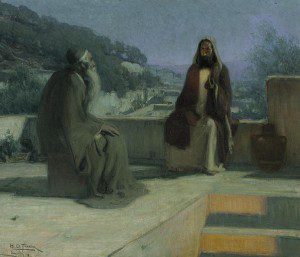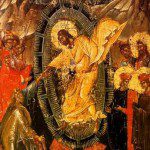
Recognition and epiphany
Lately I keep coming back to Hopkins’ lovely line, “Christ plays in ten thousand places, lovely in eyes, lovely in limbs not his….” It helps me look a little more closely and be a little more watchful for moments of recognition. And it has sent me back to the Gospel of John with its core question: Who is this man?
Jesus baffles his disciples, his adversaries, the crowds, the people he chooses to heal, even his family. Time and again he leaves them scratching their heads and wondering, “Who is this man?” They are “amazed,” we’re told. They “murmured amongst themselves.” The lame man who walked again, when asked who had healed him, didn’t know. Throughout the gospels, Jesus leaves a trail of people scratching their heads wondering who it is that has so unsettled them.
Apparently, people don’t recognize Jesus until some revelation comes to them from God that he is, in fact, the promised one. Something about this arrangement seems a little unfair from a human point of view. Why wouldn’t he just come out and say who he is? Why doesn’t he make himself clearer? The people who wonder don’t always get a straight answer. Sometimes they get a question in return. Sometimes Jesus just disappears from their midst. Why would he do that? If he intended to bring a message of hope to the whole world, why wouldn’t he have come with a blast of trumpets, and a few headlines? Or at least a press release?
Evidently because God’s way is to invite, not compel. God reveals himself again and again, but not on our terms or our timing, and sometimes in ways we tend to ignore: in Scripture which many of us neglect to search with open hearts; in nature, which many of us ignore and even destroy with overconsumption; in the faces of the poor and suffering, or of those it’s given to us to love; in the events of ordinary life. In epiphanic moments.
Epiphany is divine disclosure—an “aha!” moment when the whole frame of reference shifts and we see something we couldn’t see before that changes the terms of everything else. It’s the moment of “getting it” when the joke makes sense, or the math problem or the key to a nagging problem. The moment of recognition changes our behavior, our attitude, mood, our plans.
I have a friend who says, when he’s musing about a situation he doesn’t quite have a handle on, “I wonder what God is up to here.” He’s cultivated the habit of expecting God to show himself, precisely in the quirky, messy events that don’t make sense—the situations that don’t seem to compute.
Training them to be ready for his ongoing self-revelation, Jesus makes two promises to his followers that I believe are also meant for us: He assures them that “The kingdom of God is among you,” and he comforts them with the promise, “Behold, I am with you always.”
If we assume the Spirit is present and at work among us, then whatever comes up—whatever conflicts, uncertainties, losses, confusions–we can begin to notice how God works. He works under pseudonyms. The answer we get when we wonder where he is is just the same as Jesus’ answer to Andrew when he asked him where he was staying so he could find and follow him: “Come and see.” If we come, he’ll enable us to see.
To “come and see” is to walk in trust, expecting to be surprised, receptive to divine invitations. If we do, I believe we will begin to recognize the Kingdom of God here and now, even under the scarred, bloody surfaces of human affairs, hidden, but, paradoxically, always in the process of revealing itself.
















